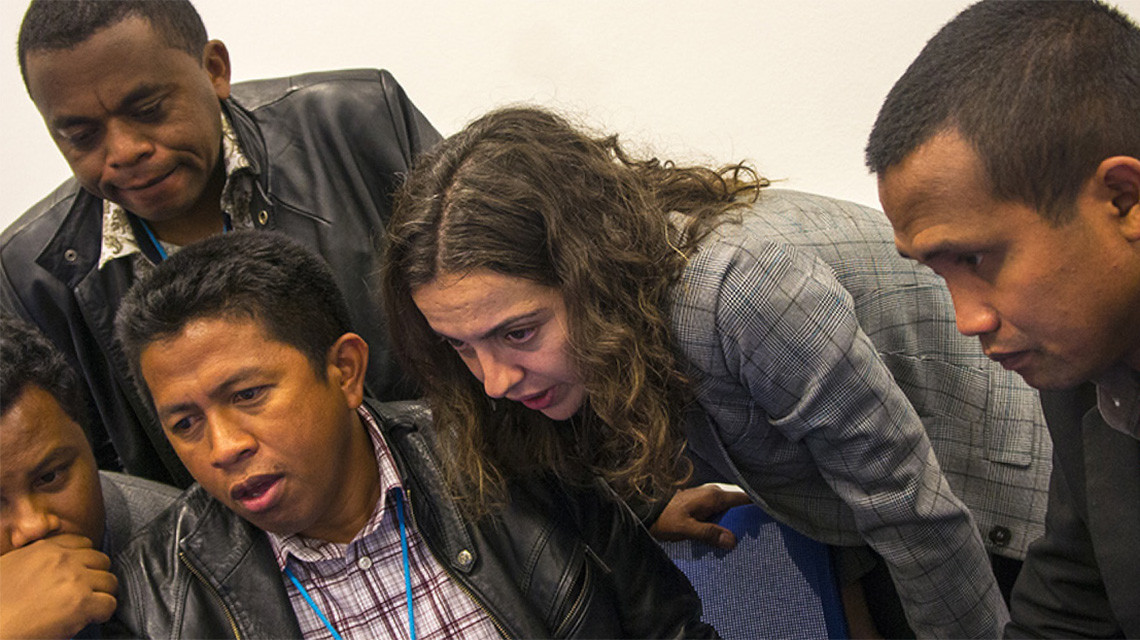Niger is putting the finishing touches on its first radiotherapy unit, set to open at the National Cancer Centre (CNLC) in the country’s capital, Niamey. It has been a long road for Niger and its partners, including the IAEA and the Islamic Development Bank (IsDB); setting up a new radiotherapy facility is a major and complex task for any country in terms of human and financial resources. Getting the donor funding and support needed requires detailed feasibility documents — often referred to as ‘bankable documents’ — outlining the infrastructure, training and equipment needs of a cancer care facility.
“For Member States, these bankable documents create a complete picture of what is needed and the costs involved; for donors, they provide the justification and reassurance of the feasibility and sustainability of these urgently needed facilities,” said Lisa Stevens, Director of IAEA’s Division of Programme of Action for Cancer Therapy.
The IAEA works closely with governments, including Niger’s, to develop such bankable documents. Once completed, they can be used to approach potential donors and funding institutions.
Countries face many challenges in addressing their health and development requirements, and the IAEA is committed to supporting efforts to improve access to effective cancer services in low and middle income countries. To achieve this, it is important to work with a broad range of international partners, including financing institutions, in order to implement innovative solutions, mobilize resources, and share skills and new technologies to best support the use of nuclear technology in addressing cancer.
“It is a very complex task for countries to meet the growing need for cancer services, particularly in Africa, where care is already extremely limited, but it can be done,” said Shaukat Abdulrazak, Director of the Division for Africa in the IAEA’s Department of Technical Cooperation. “Commitment and engagement at the highest levels of government is required to ensure that new radiotherapy services are well planned, properly funded and sustainable.”
One of the first steps towards producing a bankable document for setting up new cancer care services is to review a country’s infrastructure and capacities in cancer control. Upon request by Niger’s Ministry of Public Health, the IAEA conducted an imPACT Review in 2010, in cooperation with the World Health Organization and the International Agency for Research on Cancer. An imPACT Review is a comprehensive evaluation of a country’s cancer control system and helps local officials better understand the cancer situation. Recommendations made by imPACT Reviews, which include priorities and evidence-based interventions, support the planning and implementation of IAEA cancer-related technical cooperation projects.
The imPACT Review conducted in Niger highlighted the need to develop a training plan for cancer specialists and establish radiotherapy services, which should ideally be integrated and coordinated within a comprehensive national cancer control programme.
Niger had been collaborating with the IAEA, the Organisation of Islamic Cooperation (OIC) and the IsDB to raise funds for the expansion of its cancer services. This collaboration has taken place within a broader partnership framework initiated by the three organizations in 2012, which also involved a high-level seminar with eight countries, including Niger, to review their cancer-related funding needs. IAEA experts took part in the seminar and worked closely with each country’s national planning group to develop bankable documents.
“This IAEA support enabled Niger to submit a robust and evidence-based funding request to the IsDB that led to the approval of €3.46 million in funding in November 2014. The funding was intended for the acquisition of a linear accelerator (linac), as well as training in Morocco and Tunisia for medical oncologists, radiotherapists and radio physicists on the operationalization of the radiotherapy unit established by the Government of Niger with assistance from the IAEA,” said Mamadou Alpha Bah, Operations Team Leader (Health) in the IsDB Regional Hub of Abuja, Nigeria.
In May 2019, senior officials from Niger’s Ministry of Public Health, the Niger High Authority for Atomic Energy, the IsDB and the CNLC met a team of experts at the IAEA to discuss the final steps for the completion of the radiotherapy centre and to plan coordinated actions to support the initiation of radiotherapy treatment in the country, in line with IAEA safety standards.
Housed at the CNLC, the new centre will be staffed with a team of highly trained specialists and will have two new radiotherapy bunkers to accommodate a cobalt-60 radiotherapy machine and an advanced linac for cancer treatment. It will also have, among others, a computer tomography — or CT — simulator, dosimeters and a treatment planning system. The centre is set to provide radiotherapy services for around 600 CNLC patients from Niger and its neighbouring countries each year.
The IAEA and its partners, such as the OIC and the IsDB, will continue providing assistance to Niger in establishing quality control and management procedures and for the initiation of clinical operations, to ensure services can benefit patients for many years to come, Stevens said. This includes activities such as a joint global initiative on women’s cancers between the IAEA and IsDB and other partners, which is aimed at contributing to the global effort to save millions of women’s lives. Over a third of the initiative’s activities are planned to be implemented on the African continent, and Niger is poised to benefit as well. Hayat Sindi, Chief Advisor to the President of Science, Technology and Innovation at the IsDB, highlighted that “as women are increasingly in need of quality cancer care, we will work together to ensure that every country and every patient has access to lifesaving services. Every single woman in the world has the right to get access to cancer diagnosis, and we are proud to be involved in this significant project across Africa and the developing world.”
IAEA support enabled Niger to submit a robust and evidence-based funding request to the IsDB that led to the approval of €3.46 million in funding in November 2014.







